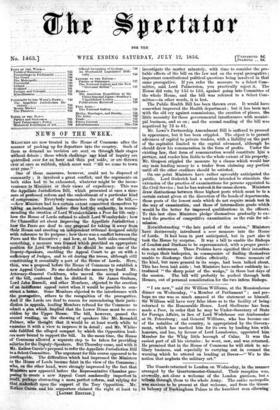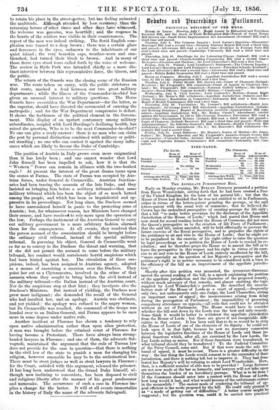The Guards returned to London on Wednesday, in the manner
arranged by the Quartermaster-General. Their reception was, avowedly, not alone a welcome of the London garrison, but a tribute through. them to the whole Army. The entire metropolis was anxious to be present at that welcome; and from the Queen in balcony of Buckingham Palace to the humblest ram elbowing to retain his place in the street-gutter, but 'one feeling animated the multitude. Although attended by less ceremony than the returning heroes of other times and other days have witnessed, the welcome was genuine, was heartfelt; and the response in the hearts of the soldiers was visible in their countenances. The aspect of the men was indeed striking. The florid English com- plexion was tanned to a deep brown ; there was a certain glare and fierceness in the eyes, unknown to the inhabitants of our quiet island, the very bearskin caps, weather-worn and sun- bleached, had turned their black to brown. And in many of those fierce eyes stood tears called forth by the voice of welcome. The review in Hyde Park was intended chiefly as a more dis- tinct interview between this representative force, the Queen, and the public.
The return of the Guards was the closing scene of the Russian war. The route taken on entry, with the public strictures on that route, marked a feud between our two great military departments ; while the illness of the Commander-in-chief has given an unusual interest to .military questions. The Horse Guards have overridden the War Department—for the latter' as the superior, should have directed the ceremonial of entering the metropolis ; and for the War Department compromise is defeat. It shows the feebleness of the political element in the Govern- ment. This display of an upstart contumacy among military subordinates, coupled with Lord Hardinge's declining health, has raised the question, Who is to be the next Commander-in-chief ? No one can give a ready answer : there is no man who can claim the post by personal distinction combined with military or politi- cal standing ; no one who can contest it against the many influ- ences which are likely to favour the Duke of Cambridge.



























